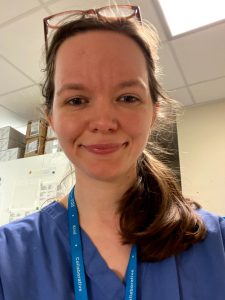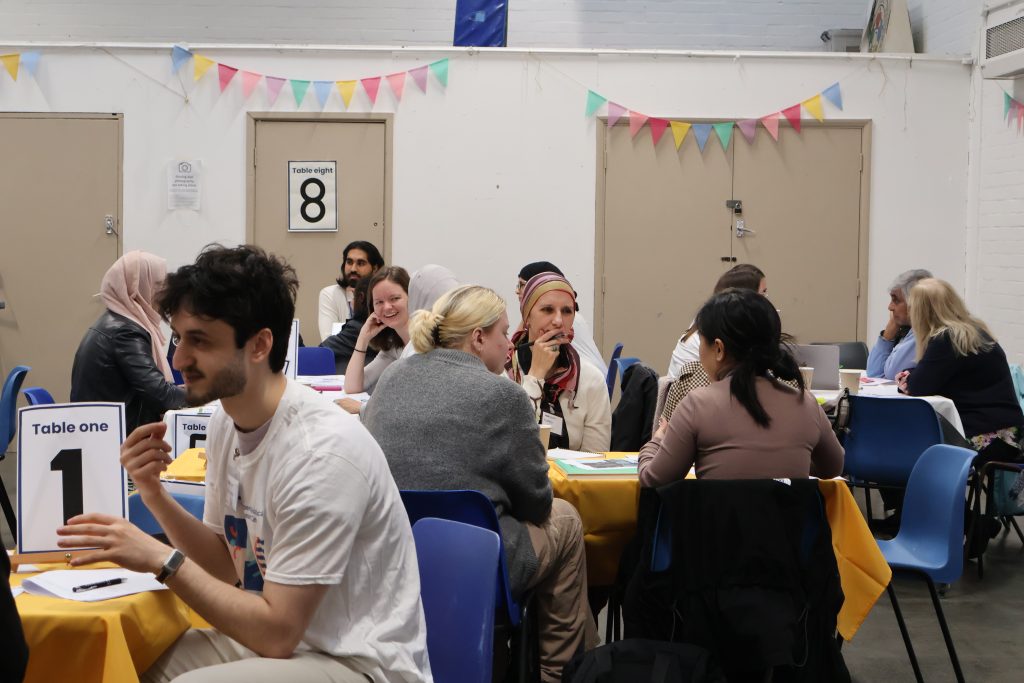In conversation with: Emma Alexander, Clinical Research Fellow in Paediatric Intensive Care at St Mary’s Hospital in London
As a doctor who works in children’s intensive care, I have always been interested in research, especially in research that matters to parents and young children. However, until this year I had never formally taken part in patient and public involvement and engagement (PPIE) activities, but I have learned a great deal from these experiences and am now an enthusiastic advocate!
In this blog post I would like to reflect a little on what I have done, and what I have learned – with all of it being thanks to the amazing members of the public who have taken the time to share their experiences and help me on my research journey.

Picture 1: Emma Alexander at St Mary’s Hospital
Where to start with PPIE?
I knew I wanted to develop as a researcher by doing PPI. Most major research funders now require you do patient and public involvement and engagement activities, so once I realised this, the first thing I did was get in touch with the amazing Imperial team at the Patient Experience Research Centre (PERC), which is run by the NIHR Imperial BRC. My main contact was Laura Alvarado Cruz, who is the Public Involvement and Project Officer at PERC. Laura was amazingly kind and patient, explaining their service and the active PPIE opportunities I could get involved with. She has been an outstanding source of guidance throughout the process, and I can’t thank her enough.
I also attended formal training in PPI which was offered by the Imperial NIHR Research Support Service. This included an introductory webinar and feedback on my plain English language research summaries and was an extremely helpful introduction to PPIE.
I learned that NIHR advise that everyone who is asked to join in PPI activities is paid – which I of course agree with! PPI activities are work, and this is even more important when involving people who may have long-term conditions or care needs. I was very fortunate to be supported by a grant from the Imperial Societal Engagement Seed Fund, so that I could ensure this was the case for all my PPIE attendees, and I received some useful feedback from the Seed Fund during my application. For example, I had talked about providing training for PPI attendees, however, I hadn’t considered that this language and perspective enforces an unequal hierarchy between researcher and PPI attendees. Instead, I reframed my application to discuss mutual experience-sharing, and thought more broadly about how we could learn together – rather than just thinking about how I could get what I wanted out of a session.
Another thing I learned during this process is that you don’t need to apply for formal ethical approval to do PPI. However, I still think it is good practice to start your PPI work with the support of an excellent organisation like PERC, who can advise you with best-practice recommendations. I also made sure I was up to date in my safeguarding training and had a plan before every session about how I could support any attendees who needed it.
What have we done so far?
My first PPIE experience was at the Ealing Community Involvement in Research event, which was run by the PERC team. I was invited by PERC to apply to host a table at this event and, luckily, I was selected. At this event, members of the public were given a menu of research topics and invited to sit and talk with researchers about their work, rotating between tables at scheduled intervals. At this event I discussed an initial research idea I have been working on, which is about improving research in children’s intensive care and in particular thinking about how children and families are cared for after they are discharged home. I was humbled by attendees’ experiences, and it gave me a lot to think about regarding the burden of intensive care, and the communities who are affected whenever any child becomes seriously unwell.
Picture 2: Researchers, including Emma (rear, centre-left), alongside community members at the Ealing Community Involvement in Research event.
After this, I decided to plan my own PPIE sessions. I organised three online discussions run via Zoom for parents with lived experience of children’s intensive care. In these sessions, I presented a PhD proposal idea I have been working on, which is about how we can ensure evidence is used at the bedside in children’s intensive care. I identified parents by reaching out to a relevant charity, who sent out my advert to their members, and I also posted on the NIHR People in Research website. PERC also helped me by advertising my online discussions amongst their own mailing lists.
Once again, I was humbled by the passion and enthusiasm of the attendees. These amazing people had been through a very difficult experience and yet were still interested in giving back and supporting my research with their thoughts and feedback. They reflected on their experiences and used this to suggest ways I could improve my research. I learned not only how to improve my research, but I also got thoughts about how I could improve my practice as a doctor, to support all children and families who are faced by the difficult experience of admission to children’s intensive care.
How has it affected our research?
All of my PPIE experiences have underlined how challenging it is to experience a child being admitted to intensive care; The experience can be alienating and cause long-term effects both for the child and their wider family. However, parents can be empowered by good-quality care that centres the parent experience. My PPIE attendees recommended extending this perspective to ensure that I am centring the parent experience within research. As a result, I have designed my proposed PhD research to center parents as key partners in my work. This includes having a parent/public advisory group with oversight and involvement in project design and dissemination. Additionally, I will conduct interviews and focus groups with parents with lived experience in the course of my research, to ensure all the work I do is in line with their experiences.
Attendees also gave me a number of specific pieces of feedback, including suggesting that patient-centred outcomes are of importance when designing trials, reflections on how best to approach and involve parents without being too burdensome, and how to use computer interfaces at the bedside to change behaviours. The parent voice and patient journey was highlighted as a powerful motivator for change, and that every treatment should be tailored to the individual child, with incorporation of the parent’s expertise.
What are we planning in the future?
We want to ensure that the parent and child voice is centred in all future research that we do within children’s intensive care. The NIHR has recognised the Paediatric Critical Care department at Imperial with Incubator status, which means that paediatric critical care is recognised as an area where there is a need to build research capacity on a national level. As part of this entrustment, we pledged to liaise with patients and the public to seek their advice on the direction of research training. I will be using my funding from the Imperial Societal Engagement Seed Fund to organise PPIE discussions with parents who want a more long-term role advising on research within paediatric intensive care, supported by my supervisor, Professor Padmanabhan Ramnarayan, and his wider team in the Paediatric Critical Care Incubator. In this way, we hope to create a sustainable model where the parent and child voice is always involved when designing research in our field in the future.
For me personally, the PPIE work I have done has been enlightening and often extremely moving. I am so grateful for the parents and young people I have spoken to along the way who have helped me design my research. I now have a passion for PPIE that I will carry with me for the rest of my career as a researcher and I hope to inspire others to join me on this journey as we seek to improve research within children’s intensive care, centring the child and parent voice throughout.

